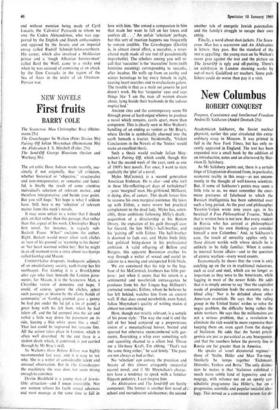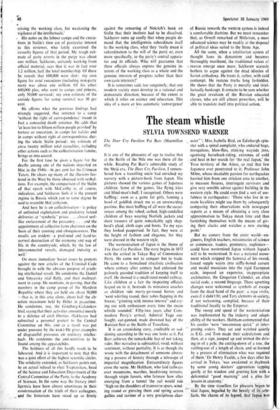New Columbus
ROBERT CONQUEST
Progress, Coexistence and Intellectual Freedom Andrei D. Sakharov (Andrd Deutsch 25s) Academician Sakharov, the Soviet nuclear physicist, earlier this year circulated this extra- ordinary essay in Moscow. It was printed in full in the New York Times, but has only re- cently appeared in England. The text has been expanded into a small book by the addition of an introduction, notes and an afterword by Har- rison D. Salisbury.
As Mr Salisbury points out, there is a certain tinge of Utopianism divorced from, in particular, economic reality in this essay—as not uncom- monly in the thought of well-known scientists. But, if some of Sakharov's points may seem a little trite to us, we must remember the enor- mous pressures of falsehood to which the Russian intelligentsia has been submitted over such a long period. As the poet and philosopher Yesenin-Volpin wrote nine years ago, in his heretical A Free Philosophical Treatise, 'Much that is written here is not new. But every student in Russia who has arrived at philosophical scepticism by his own thinking can consider himself a new Columbus.' And, in Sakharov's case, the touch of unreality applies only to those distant worlds with whose details he is unlikely to be fully familiar. When it comes to internal Soviet affairs—and to the question of atomic warfare—every word counts.
Economically he shows that the USSR is only catching up on the us in traditional industries, such as coal and steel, which are no longer as important as they were to the Americans, while lagging in most of the newer fields. He adds that it is simply untrue to say 'that the capitalist mode of production leads the economy into a blind alley.' Nor is he deluded about other American essentials. He says that 'the ruling group in the United States' wishes to solve the negro problem, the difficulty being rather the white workers. He says that the millionaires are not a serious problem, that a revolution to eliminate the rich would be more expensive than keeping them on, even apart from the danger of Stalinism. He adds that the Soviet privili- gentsia are just as parasitical as any bourgeoisie, and that the numbers below the poverty line in Russia are far greater than in America.
He speaks of 'cruel dictatorial regimes'— those of 'Stalin, Hitler and Mao Tse-tung.' Similarly he lumps together 'Eichmann, Himmler, Yezhov and Beria.' The only distinc- tion he makes is that 'Stalinism exhibited a much more subtle kind of hypocrisy and de- magogy, with reliance not on an openly can- nibalistic programme like Hitler's,- but on a progressive, scientific and popular socialist ideo- logy. This served as a convenient screen for de-
ceiving the working class, for weakening the vigilance of the intellectuals.'
, His notes on the labour camps and the execu- tions in Stalin's time are of particular interest to this reviewer, who lately examined the casualty figures of that period. My rough esti- mate of party arrests in the purge was about one million. Sakharov, certainly working from official material, says that it was in fact over 1.2 million, half the total membership. Of these he reveals that 600,000 were shot: my own figure for total executions (including non-party men) was about one million. Of his other 600,000 plus, who went to camps and prisons, only 50,000 survived: my own estimate of the outside figures for camp survival was 10 per cent.
He affirms what the previous findings had strongly suggested, that sentence to a camp 'without the right of correspondence' meant in fact a concealed death sentence. He adds that 'at least ten to fifteen million people perished' by torture or execution, in camps for kulaks and in camps without right of correspondence, dur- ing the whole Stalin period: my estimate of circa twenty million total casualties, including other actions such as the collectivisation famine, brings us into accord.
For the first time he gives a figure for the deaths among one of the nations deported en bloc in the 1940s-46 per cent for the Crimean Tatars. He clears up many of the illusions fos- tered in the West by those obsessed with verbal- isms. For example, the comparison of the Stalin of that epoch with McCarthy is, of course, ridiculous, and Sakharov feels it is the present regime in Russia which can to some degree be said to resemble McCarthyism.
And here he is on collectivisation—'a policy of unlimited exploitation and predatory forced deliveries at "symbolic" prices . . . almost serf- like enslavement of the peasantry . . . and the appointment of collective-farm chairmen on the basis of their cunning and obsequiousness. The results are evident—a profound and hard-to- correct destruction of the economy and way of life in the countryside, which, by the law of interconnected vessels, damaged industry as Well.'
On more immediate Soviet issues he protests against the new articles of the Criminal Code brought in with the obvious purpose of crush- ing intellectual revolt. He condemns the Daniel and Sinyaysky trial flatly, and their maltreat- ment in camp. He mentions, in passing, that the numbers in the camp group of the Mordvin Republic where they are held are about 50,000 that is, in this area alone, about half the ab- solute maximum held by Hitler in peacetime. He condemns, too, the Ginzburg-Galanskov trial, saying that their activities amounted merely to a defence of civil liberties. (Sakharov had submitted a personal protest to the Central Committee on this, and as a result was put under pressure by the mai.) He gives examples of disgraceful pressures on ordinary intellec- tuals. He condemns the anti-semitism to be found among the apparatchiks.
The boldness of all this hardly needs to be laboured. And it is important to note that this was a joint effort of the highest scientific circles. The solidarity extended, as Sakharov points out, to an actual refusal to elect Trapeznikov, head of the Science and Education Department of the Central Committee of the Party, to the Academy of Sciences. In the same way the literary intel- ligentsia have been almost unanimous in their condemnation of the trials of their colleagues, 9nd the historians have stood up so firmly against the censuring of Nekrich's book on Stalin that their institute had to be dissolved. Sakharov sums up coolly that when people de- mand that the intelligentsia subordinate itself to the working class, what they 'really mean is subordination to the will of the party or, even more specifically, to the party's central appara- tus and its officials. Who will guarantee that these officials always express the genuine in- terests of the working class as a whole and the genuine interests of progress rather than their own caste interests?'
It is sometimes said, too sanguinely, that any modern society must develop in a rational and democratic direction, because of the- extent to which 'it relies on science and education. This idea of a more or less automatic 'convergence' of Russia towards the western system is indeed a comfortable doctrine. But we must remember that, as Orwell remarked of Hitlerism, a most advanced science may be readily at the-disposal of political ideas suited to the Stone Age.
All the same, when a totalitarian system of thought- loses its dynamism and becomes thoroughly moribund, the traditional values of reason emerge once more. SakharoV scarcely bothers to argue against the dead idiocies of Soviet orthodoxy. He treats it, rather, with cold contempt_ He restates truths long forbidden. He shows that the Party is morally and intel- lectually bankrupt. It remains to be seen whether the great revulsion of the Russian educated classes, who are still almost powerless, will be able to translate itself into political action.



































 Previous page
Previous page